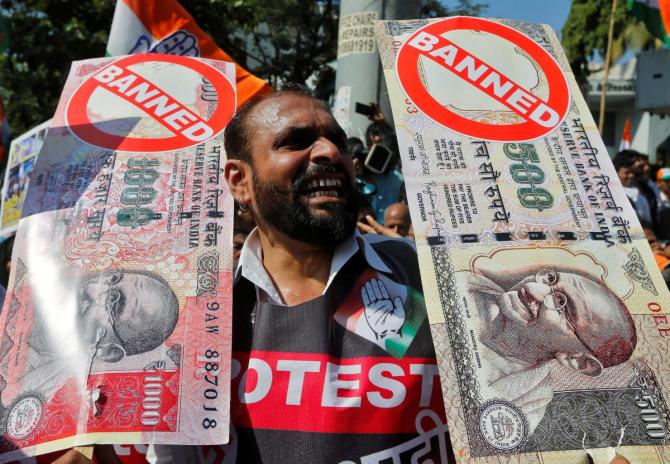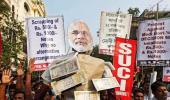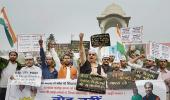Resisting the Supreme Court's attempt to revisit the 2016 demonetisation exercise, the government said on Friday the court cannot decide a matter when no tangible relief can be granted by way of "putting the clock back" and "unscrambling a scrambled egg".

The remarks by Attorney General R Venkataramani came after the apex court asked the Union government to explain whether it consulted the central board of the Reserve Bank of India (RBI) before undertaking demonetisation of Rs 500 and Rs 1000 denomination notes in 2016.
A five-judge Constitution bench headed by Justice S A Nazeer is hearing a batch of 58 petitions challenging the demonetisation exercise.
"The only submission you have made is that these are all economic issues done by experts (so) don't touch it. What is your opposition to the plea of the other side? Tell us what is your submission to counter their submissions. They said it is not in conformity with section 26 (2) of the RBI Act.
"You are arguing that the objectives set out have been achieved. But, we want you to address the allegation that the process followed was flawed. Show us the procedure was followed or not," the bench, also comprising Justices B R Gavai, A S Bopanna, V Ramasubramanian, and B V Nagarathna, said.
Section 26(2) of the RBI Act says "On recommendation of the central board the central government may, by notification in the Gazette of India, declare that, with effect from such date as may be specified in the notification, any series of bank notes of any denomination shall cease to be legal tender save at such office or agency of the Bank and to such extent as may be specified in the notification."
The court's observation came after Venkataramani defended the demonetisation policy and said the court should refrain from exercising judicial review of the executive decision.
"It is well settled that if the relevance of scrutiny disappears, the court will not render opinion on questions of academic value. The court will not grant a declaration when no tangible relief can be granted by way of putting the clock back which is unscrambling a scrambled egg," Venkataramani said.
The AG submitted that "pedestrian" considerations such as whether there was a recommendation or a consultation will reduce section 26 (2) of the RBI Act to a narrow area, stultifying the entire complexity of management of currency monetary policy.
"Demonetisation was not an isolated economic policy. This was a complex monetary policy. Entirely different considerations will follow. The degree of deference must also be higher...The role of the RBI has evolved. We are not looking at some black money here and there, some fake currency here and there. We are trying to look at the big picture.
"Also, no well-meaning person will say that just because you have failed, your intention was also flawed. This does not make logical sense," he said.
At this point, Justice Gavai said the contention of the petitioners opposing demonetisation is about everything that is to be done with regard to currency.
"It's a primary duty of RBI and therefore section 26(2) of RBI Act should have come from RBI. There is no dispute with the contention that RBI has a primary role in dictating monetary policy," Justice Gavai remarked.
Venkataramani said the petitioners argued that RBI must apply its mind independently but the working of RBI and the government must be seen from a flexible point of view as both have a symbiotic connection.
Justice Nagarathna said the argument was that the Act recognises the expertise of those in the RBI and the legislation recognises the expertise of the Central Board of RBI.
"We are not saying that you are bound by that recommendation or not. The question is where should it emanate? The central government legislation recognises the expertise of the central board of RBI. The argument is where is that? she asked.
As the hearing commenced in the morning, senior advocate Shyam Divan, appearing for a man seeking to exchange Rs 1.62 lakh in old currency notes, submitted his client went abroad on April 11, 2016.
"When the PM's announcement came, there was an assurance from the PM and the RBI that December 30, 2016, was the deadline, but even after that he would be able to exchange demonetised notes.
"He had withdrawn 1.62 lakh rupees. On February 3, 2017, he returned and tried to exchange the money. But his application was rejected. An ordinance was passed saying that no exchange would be allowed post December 31, 2016," Divan said, adding the notice by the government does not contemplate a situation where someone leaves money in the country and goes abroad.
He submitted his client cannot be deprived of his property arbitrarily and sought extension of grace period to exchange the old notes.
"This court may intervene in individual cases, but given the vastness of our country and the circumstances, the RBI needs to take a broader approach. They should have a general circular for circumstances like these," he said.
Justice Gavai said prime facie genuine cases may be independently considered by the RBI.
The hearing remained inconclusive and will resume on December 5.
Calling the demonetisation of Rs 500 and Rs 1000 currency notes "deeply flawed", senior lawyer P Chidambaram had told the apex court on Thursday the Union government cannot on its own initiate any proposal relating to legal tender which can only be done on the recommendation of the RBI's central board.
Chidambaram, appearing for one of the petitioners opposing the Centre's 2016 decision, submitted before the five-judge Constitution bench that the right to regulate the issue of bank notes entirely vests with the Reserve Bank of India.
The Centre recently told the top court in an affidavit the demonetisation exercise was a "well-considered" decision and part of a larger strategy to combat the menace of fake money, terror financing, black money and tax evasion.
Defending its decision to demonetise currency notes of Rs 500 and Rs 1000 denominations, the Centre had told the apex court the step was taken after extensive consultation with the Reserve Bank of India and advance preparations were made before the note ban was enforced.










